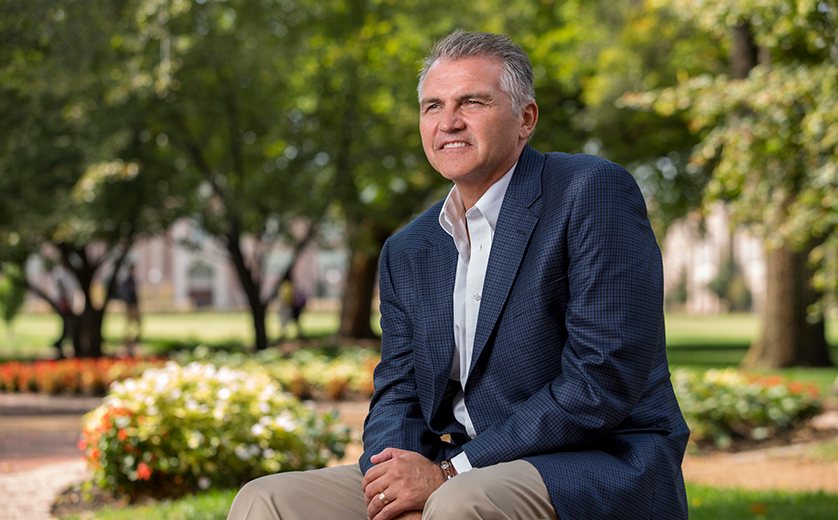The Brown School community is saddened by the loss of David Patterson Silver Wolf, associate professor.
An Irish/Cherokee descendent, David’s research focused on two main areas: substance abuse recovery and advocating for underrepresented minority college students, especially those from American Indian/Alaska Native populations.
David was kind, with a brilliant smile and a subversive sense of humor. He did not stand on ceremony or pay much attention to hierarchy –he invited conversation and made those he interacted with feel seen on a deeply personal level. David didn’t suffer nonsense or what he perceived as unnecessary bureaucracy. Rather, he built a life dedicated to improving the lives of others.
Trailblazing Scholar
David was the first professor of Native descent at the Brown School. In his work with the Kathryn M. Buder Center for American Indian Studies, he supported Buder Center staff on many projects, studies and events, including Buder Orientation and the Annual Pow Wow. On one memorable occasion, he sang a traveling song at the annual Buder Center Blessing Ceremony. His photo is included in the slideshow of this year’s virtual ceremony.
“His impact with the Buder Center is far-reaching and powerful,” said Mary McKay, Neidorff Family and Centene Corporation Dean of the Brown School.
“He was an invaluable mentor for Indigenous students and a great advocate for Indigenous peoples. We want to acknowledge and express gratitude for all of his many contributions to our community,” said Kellie Thompson, director of the Buder Center.
Changing the Paradigm for Substance Disorder Treatment
David was passionate about bringing evidence-based approaches to substance-disorder treatment. He served as the chief research officer for the Community Academic Partnership on Addiction (CAPA) Clinic, a partnership between the Brown School and Preferred Family Healthcare.
David hoped the unique partnership model would be replicated by university hospitals and medical schools. He realized that there was a dearth of hard data to guide addiction treatment and behavioral health professionals – the treatment and recovery process is monitored exclusively on a therapist’s intuition. David knew this from his 15 years of experience providing such services.
This led him to co-found Takoda and create PsychoSocial Sync. The performance dashboard tool displays key, real-time performance indicators that enable therapists to evaluate the effectiveness of treatment interventions and recovery progress.
The dashboard, which includes mobile apps, was implemented under David’s leadership in partnership with addiction treatment providers in the St. Louis region. After clinicians were trained to use the dashboard, they saw an 11% increase in addiction treatment completion rates over six months.
Recently, a multi-disciplinary team at Institute of Clinical and Translational Sciences (ICTS) published a new case study highlighting the dashboard’s impact, under the leadership of Professor Doug Luke.
David’s latest book, “The New Addiction Treatment“(Oxford University Press), discusses addiction treatment and the surrounding industry from the perspective of both a patient and a treatment provider.
Improving the Odds for Minority College Students
One prong of his research centered on social-belonging interventions for minority college students. David noted that research showed college graduates had greater overall health, a brighter outlook on life and other benefits that they passed on to their children. But with a drop-out rate of approximately 30%, minority students can miss out on these benefits.
He tested the effectiveness of a structured introduction via a 13-minute video, “You Are College Material — You Belong,” followed by group discussion, among students at St. Louis Community College-Forest Park. The results he published demonstrated the power of community.
“The college culture and traditions oftentimes conflict with minority culture and traditions. Further, when there are feelings of a lack of belonging, small things, like being ignored or getting a poor grade, can cause those feelings to increase. These seemingly small acts can result in the decision to drop out, which has huge consequences,” said David.
This conversation was personal for him. In the monograph “An Education Saved My Life,” David shares how he navigated a difficult family life, educational challenges, and addiction with the support of a foundational community and the pursuit of higher education. He believed any student could thrive in a college setting as long as they were able to create a sense of ‘belongingness’ in spite of perceived flaws.
“The best relationship is not the one that brings together perfect people; it is when each individual learns to live with the imperfections of others and can admire other people’s good qualities.”
David was 57 when he passed away on May 14, 2021. He was surrounded by his loving family, with hospice at home, after being diagnosed with glioblastoma cancer last fall.
In celebration of David’s personal and professional legacy, his colleagues and friends have established the David Patterson Silver Wolf Endowed Scholarship, which will support generations of Brown School students in perpetuity. Those interested in contributing to the scholarship in David’s name may do so online, or by contacting Lia Nunez, associate director of Advancement, at lmnunez@wustl.edu.
